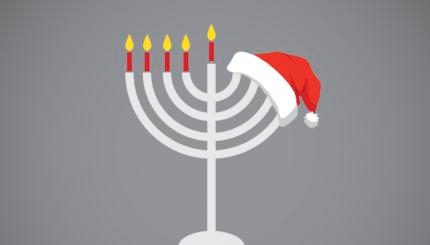Christmas is approaching, which means it’s time to make jokes about Chinese food, going to the movies, and how guilty we feel liking all those pretty lights.
Let’s face it, more American Jews think and talk about their Jewish identity during Christmas than, say, Shavuot. Does that make Christmas a special day for Jews?
Well, yes. Sort of. And this is nothing new. If you haven’t yet, make sure to read Joshua Plaut’s fascinating article about Jews and Christmas. Among Plaut’s historical tidbits are these about Theodor Herzl and Gershom Scholem:
The Viennese socialite Fanny Arnstein, a co-founder of the Music Society of Austria, was among the first Jews to introduce a Christmas tree into the home, an act also practiced by none other than the father of modern Zionism, Theodor Herzl. Indeed, after Herzl completed his seminal book on Zionism in 1895, Vienna’s Chief rabbi visited him at his home during the month of December. This historically significant meeting took place with a Christmas tree in view.
In Berlin, the great scholar of Jewish mysticism, Gershom Scholem, grew up in a home that celebrated Christmas “with roast goose or hare, a decorated Christmas tree which my mother bought at the market by St. Peter’s Church, and the big distribution of presents for servants, relatives, and friends…An aunt who played the piano treated our cook and servant girl to ‘Silent Night, Holy Night.'” (MORE)
When you’ve read Plaut’s overview, check out his companion piece on Jews and Christmas in Eastern Europe, which describes customs like card playing and reading The Tales of the Crucifix.
Over the centuries Jews developed customary Christmas activities. Certain East European Jews covertly read Ma’se Talui (The Tales of the Crucifix), a secret scroll containing derogatory versions of the birth of Jesus. Such legends are part of a genre of Jewish legends called Toledot yeshu (History of Jesus). These legends first appeared in Hebrew in the thirteenth century (with possible earlier renditions written in Aramaic) and circulated in different versions throughout the Middle Ages. Toledot Yeshu describes Jesus as the illegitimate son of Mary by the Roman soldier Panthera. According to these tales, Jesus’ powers derived from black magic, and his death was a shameful one. (MORE)
One thing is pretty obvious from Plaut’s survey: Apparently it was hard to find a good Chinese restaurant back in the shtetl.
There. I made my joke. Now can you please pass the egg nog?

